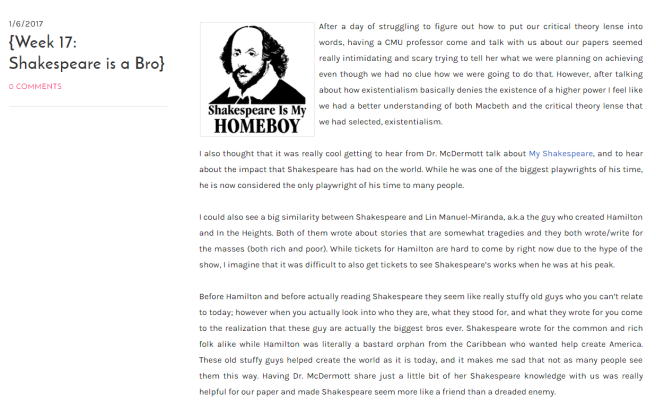Generally speaking, people like routine in their lives, but every once in awhile routines need shaken up or else the teacher’s voice may unintentionally become the “wah, wah, wah” of the adults in the world of Peanuts.
It is this fate I strive to avoid.
Though routine is a good thing, too much leads to stagnation.
To break up the regular scheduled programming in the classroom I invite guest speakers as frequently as the topic in class permits. One such moment is when student teams view Shakespeare’s Macbeth or King Lear through the lens of an agreed upon critical theory whose topics range from Feminist to Psychological criticism.
But, first I ask Macbeth teams to read and discuss Dr. Kristen McDermott’s “Angels and Ministers of Grace: Theatrical Superstitions through the Ages” and King Lear teams to read and discuss a different McDermott piece “Winter Fool, Summer Queen: Shakespeare’s Folklore and the English Holiday Cycle” as they consider self-selected critical theory lenses.
The task requires a complex synthesis of ideas and is an opportune time for students to meet Shakespearean scholar, author, and friend Dr. McDermott.
Though our practices evolved over time, typically Kris and I begin our discussion with Kate Tempest’s poem “My Shakespeare.”
Students hear through spoken word the way in which the bard has shaped language in cultures across the world. Students understand quickly why Shakespeare is still relevant today despite living in the 16th century.
Kris explains that Shakespearean references have so permeated the English language we often don’t realize expressions like, “There’s a method in the madness,” refers to Polonius diagnosing Hamlet with “love-melancholy” in Hamlet Act 2 scene ii.
She then reminds students of pop culture influences Shakespeare has in today’s society, even though he was not an icon during his lifetime as he is today – there were no bobbleheads of him.
After this brief introduction of her knowledge of the bard, she shares her informative yet magical book William Shakespeare: His Life and Times and students see what passion for writing and love for literature looks like.
Take a look inside:
As it is passed around the room, students spend some time looking at the whimsical pages, flaps, and pull outs designed to resemble a Shakespearean portfolio. Kris along with her co-author, Ari Berk, wrote from the perspective of William Shakespeare curating a scrapbook of his life for his daughter as he retires from the theatre. Spending some time on an author-led book talk encourages students to consider varied perspectives of Shakespeare.
Shortly thereafter students speak with Dr. McDermott in a Q&A format where, working in their critical lens teams, they ask specific questions that range from Feminism found in Macbeth to the psychological underpinnings subtlety resting in King Lear.
In this space students have focused responses that help frame their thoughts and affirm their perspective regarding the works they have selected.
Consider the following student reflections:

and

Student reflections are a great window into a student’s mind.
Of course, as an educator, I began with the end in mind and seeking a guest speaker for the sake of solely breaking up the monotony is not productive. The end goal is to give students an opportunity to shape their ideas about theory and Shakespearean drama by speaking with a Shakespearean scholar who help all of us consider varied perspectives and approaches to the work.
Recognizing the variety speakers at our fingertips, there is nothing as effective as a guest speaker who is live and in person. All a teacher needs to do is to reach out to experts in the field and, I have found, university professors are eager to share their expertise.
Though practice of inviting guest speakers into the classroom is not new it is important.
Students appreciate the insight from resident experts in the field. They are encouraged by hearing another voice in the room who shares an interesting perspective on a topic. Teachers benefit by building bridges between learning communities and friendships gained. Speakers find they enjoy working with teens, creating connections through educational outreach.
I remember the first time I invited a speaker into my classroom. I was nervous and felt as if I was stepping outside my comfort zone. Many questions entered my mind: How would students respond to the speaker? What if the speakers ideas contradict my own? What will I do if students have no questions? All of these questions proved to be nothing more than nerves.
I, too, was shaking up my classroom routine and venturing into unknown territory. It is a risk I was glad I took because, by seeking guest speakers, my classroom has become more fully alive. The work we do in class becomes authentic, and students are able to experience Literature-minded and writing-conscious people who love nothing more than to share their passions with young learners – a welcome routine in any classroom.
